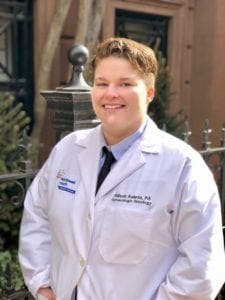Language and Its Role for Inclusivity for LGBTQ+ Patients | Q&A with Allison Asante, PA-C

Allison Asante, PA-C
The year 2020 was fraught with change for everyone, particularly those within the healthcare systems and in more than one way. In Nov 2020, Allison Asante, PA-C, wrote a guest column for SGO entitled “Improving Care for LGBT Individuals In An Imperfect System”. Building upon themes expressed in that piece, Asante discusses best practices for health care professionals to ensure they are asking questions more respectfully and mindfully to their LGBTQ+ patients.
How does language and trust play a role when interacting with patients, particularly those in marginalized groups?
Personally, I think listening skills and language are the keys to developing trust with patients. Truly listening to people, while staying on schedule in clinic is an art, so I will focus the simpler task of language. People in marginalized groups are looking carefully to see if you can be trusted. Prior to trusting you with their lives, people need to understand you see them as a person. In terms of language pertinent to the LGBT+ population, I recommend neutralizing your language as much as you can. Do not assume patients’ sexual or gender identity, ask them! The more you practice these two changes, the more inherently inclusive you are of everyone. Some things I have been working on in my practice:
- Asking all patients their pronouns. If you are not comfortable using neo pronouns (i.e. xe, ze and ey), simply refer to your patient by name.
- When speaking generally about my patient population, I have replaced “women” with “patients” or “people”.
- When speaking about other people/providers to the patient, I just use they rather than he/she. This removes gender biases as well.
What advice would you give to those professionals who are nervous about putting into practice LGBT+ cultural competency?
Many people feel overwhelmed about cultural competency in general. Personally, I do not think you need to become an expert in a culture to provide culturally competent medical care. A time-saver is to make your office explicitly welcoming. This makes LGBT+ and other marginalized groups more comfortable from the start so you don’t have to spend time in the patient room attempting to gain trust. There are many ways to do this – with pro diversity signage, making sure your intake forms are inclusive, and employing a diverse staff. If you take the time to craft intake forms that go beyond the traditional social history to ask about gender identity, sexuality, preferred names/pronouns, and even religious ideology you can get a sense of your patient’s identity before even walking into the room. Electronic medical record “work-arounds” are also important to quickly communicate within the health system. For example, at Northwell, we utilize the alert tab in our medical record to notify everyone accessing the chart if a patient’s pronouns or name do not match the ones we obtained from legal documents. With a few modifications you can make your routine care inclusive.
Could you talk a little bit on how to ask questions that are more respectful?
This again can be simplified down to language. I recommend the same changes as before – neutral language and open-ended questions. Ask the patient – Do you smoke? As opposed to saying – you don’t smoke right? In terms of an inclusive sexual history, my line of questioning is as follows: Are you sexually active? What genders are you active with? Are you monogamous? This line may carry on for more details if the patient needs STD screening or is has a sexual complaint. Open ended questions and not assuming the answers will help your patients be open about sensitive topics.
In what ways can medical professionals work towards providing better patient care and LGBT+ cultural competency?
Ask the LGBT+ people in your life about their experiences. Ask them how they feel while accessing healthcare to get a deeper understanding of their experience. Allyship is active. Fixing healthcare disparities overall is a daunting task, but small steps incorporated into your everyday routines can help make you a better ally to all marginalized groups. A small move providers could do today is add their pronouns to their email signature. One quick read I would suggest for further education would be to visit the National LGBT Cancer Network’s page, The LGBT Community’s Disproportionate Cancer Burden.
Any closing remarks or key take-aways you wish SGO members to have on this topic?
The way you speak and ask questions can be explicitly inclusive with some effort. Think about the words you pick when referring to patients and the way you ask more sensitive questions. With a bit of brainstorming, office education and thoughtful language you can make your practice welcoming to all.
Allison Asante is a non-binary identified Gynecologic Oncology Physician Assistant at Northwell Health in New York City. They specialize in survivorship care, chemotherapy management, cervical dysplasia and LGBT+ affirming gynecologic care. They are currently getting their MBA in Strategic Healthcare Administration hoping to move into cancer care administration.
This column is sponsored by an unrestricted grant from GSK. Sponsorship excludes editorial input. Content developed by the SGO Diversity, Inclusion & Health Equity Committee.